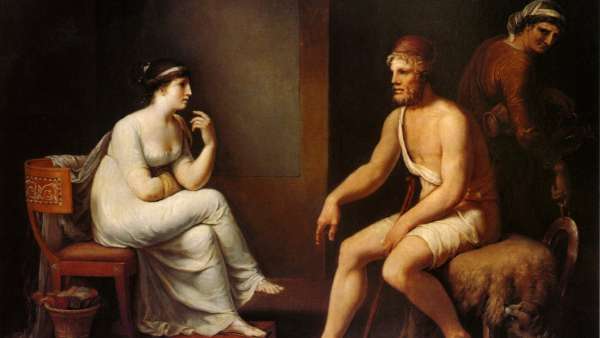The Odyssey is the story of family, love, justice, virtue, and vice. The tale of how they are woven into civilization. On a basic level, it is about a man’s journey home. More deeply, it is about the travails of an abandoned family; it’s about the unlawfulness of swaggering masculinity; it’s about the forbearance of a faithful wife. An epic of many tales about a man of many twists and turns.
Odysseus
Odysseus, like all, is a flawed man. The man of strife is the inverse of hot Achilles, in his serene, calculated wisdom. He leaves his family to fight a war. Ten years on, with the war won and plunder shared, he doesn’t exactly rush home. Depending on which of the two stories the man of convolutions tells is true, he was either sold into slavery or had ten years of supernatural journeys. The former paints him as the better man, though foolish with his endless raiding. The later portrays him as the unfaithful husband, an absentee father, in no hurry to return home. Eventually, with the help of the Phaeacians, a lawful people, he returns home. There he restores the law and regains marital unity.
Penelope
Penelope is the anti-Clytaemestra, standing by her family against suitors rather than betraying them; she is everything Helen is not. She is the ideal wife, as seen by Agamemnon in Hades, loyal, long-suffering, wise, holding the walls against the dissolution of hearth and home. She is faithful and sacrifices endlessly to defend Telemachus, spending twenty years of her prime with a missing husband.
Telemachus
Telemachus provides the prototypical coming of age story. From a boy, he grows into a lethal force and devises a plan to seize the reins of manhood. He becomes a lawful and righteous man, even without the guidance of his father. This is a contrast to the suitors, who, despite the presence of fathers, grow into swaggering fools.
Antinous
Antinous is the opposite of Telemachus in lawfulness, and the inverse of Odysseus' high intellect, in low cunning. He is the epitome of the spoiled brat, grown into a violent and entitled man, a man who is to eventually be on the receiving end of a red wedding, old testament justice.
Eumaeus
Eumaeus is the exemplar of loyalty and lawfulness in the common man, the antithesis of Melanthius. his honorable nature raises him above the suitors, high in station, who debase themselves by flouting justice.
Takeaways
This tale addresses vice and virtue in all walks of life; a juxtaposition of right and wrong. The suitors and Telemachus in nobility, Eumaeus and Melanthius as common men, Odysseus as the beggar and Arnaeus as the poor.
This tale of tales, about the man of twists and turns, highlights the marital bed and unity of the family; it weaves the fabric of civilization from its fibers. It illuminates home as the most important place to be. It is a cautionary tale for those who would tarry away from home in search of wealth and glory, one that tells a story of returning home to find it no longer there. It elucidates true wisdom as fidelity, hospitality, and a swift return to those you love.
Thoughts on the Robert Fagles Translation
I read through the Robert Fagles translation and found it enjoyable, more so than his Iliad. The reading was rich in imagery and, although I don’t know ancient Greek yet to judge against Homer, it definitely had beautiful poetry. This read almost like a modern novel. There were few or no awkwardly rendered portions. It was something you could sit down and really fall into.
